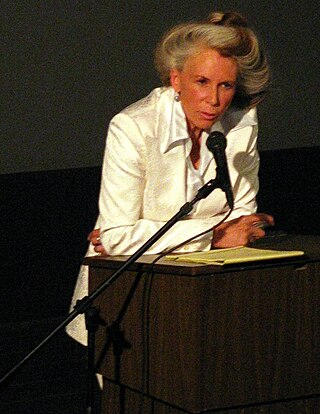Related Research Articles
Feminism is a range of socio-political movements and ideologies that aim to define and establish the political, economic, personal, and social equality of the sexes. Feminism holds the position that modern societies are patriarchal—they prioritize the male point of view—and that women are treated unjustly in these societies. Efforts to change this include fighting against gender stereotypes and improving educational, professional, and interpersonal opportunities and outcomes for women.
Radical feminism is a perspective within feminism that calls for a radical re-ordering of society in which male supremacy is eliminated in all social and economic contexts, while recognizing that women's experiences are also affected by other social divisions such as in race, class, and sexual orientation. The ideology and movement emerged in the 1960s.
The sex-positive movement is a social and philosophical movement that seeks to change cultural attitudes and norms around sexuality, promoting the recognition of sexuality as a natural and healthy part of the human experience and emphasizing the importance of personal sovereignty, safer sex practices, and consensual sex. It covers every aspect of sexual identity including gender expression, orientation, relationship to the body, relationship-style choice, and reproductive rights. Sex-positivity is "an attitude towards human sexuality that regards all consensual sexual activities as fundamentally healthy and pleasurable, encouraging sexual pleasure and experimentation." It challenges societal taboos and aims to promote healthy and consensual sexual activities. The sex-positive movement also advocates for comprehensive sex education and safe sex as part of its campaign. The movement generally makes no moral distinctions among types of sexual activities, regarding these choices as matters of personal preference.
This is an index of articles related to the issue of feminism, women's liberation, the women's movement, and women's rights.
Philosophy of sex is an aspect of applied philosophy involved with the study of sex and love. It includes both ethics of phenomena such as prostitution, rape, sexual harassment, sexual identity, the age of consent, homosexuality, and conceptual analysis of more universal questions such as "what is sex?" It also includes matters of sexuality and sexual identity and the ontological status of gender. Leading contemporary philosophers of sex include Alan Soble, Judith Butler, and Raja Halwani.
Sex-positive feminism, also known as pro-sex feminism, sex-radical feminism, or sexually liberal feminism, is a feminist movement centering on the idea that sexual freedom is an essential component of women's freedom. They oppose legal or social efforts to control sexual activities between consenting adults, whether they are initiated by the government, other feminists, opponents of feminism, or any other institution. They embrace sexual minority groups, endorsing the value of coalition-building with marginalized groups. Sex-positive feminism is connected with the sex-positive movement. Sex-positive feminism brings together anti-censorship activists, LGBT activists, feminist scholars, producers of pornography and erotica, among others. Sex-positive feminists believe that prostitution can be a positive experience if workers are treated with respect, and agree that sex work should not be criminalized.

Catharine Alice MacKinnon is an American feminist legal scholar, activist, and author. She is the Elizabeth A. Long Professor of Law at the University of Michigan Law School, where she has been tenured since 1990, and the James Barr Ames Visiting Professor of Law at Harvard Law School. From 2008 to 2012, she was the special gender adviser to the Prosecutor of the International Criminal Court.
Feminist legal theory, also known as feminist jurisprudence, is based on the belief that the law has been fundamental in women's historical subordination. Feminist jurisprudence the philosophy of law is based on the political, economic, and social inequality of the sexes and feminist legal theory is the encompassment of law and theory connected.The project of feminist legal theory is twofold. First, feminist jurisprudence seeks to explain ways in which the law played a role in women's former subordinate status. Feminist legal theory was directly created to recognize and combat the legal system built primarily by the and for male intentions, often forgetting important components and experiences women and marginalized communities face. The law perpetuates a male valued system at the expense of female values. Through making sure all people have access to participate in legal systems as professionals to combating cases in constitutional and discriminatory law, feminist legal theory is utilized for it all.
Antisexualism is opposition or hostility towards sexual behavior and sexuality.
Pro-feminism refers to support of the cause of feminism without implying that the supporter is a member of the feminist movement. The term is most often used in reference to men who actively support feminism and its efforts to bring about the political, economic, cultural, personal, and social equality of women with men. A number of pro-feminist men are involved in political activism, most often in the areas of gender equality, women's rights, and ending violence against women.
Postmodern feminism is a mix of post-structuralism, postmodernism, and French feminism that rejects a universal female subject. The goal of postmodern feminism is to destabilize the patriarchal norms entrenched in society that have led to gender inequality. Postmodern feminists seek to accomplish this goal through opposing essentialism, philosophy, and universal truths in favor of embracing the differences that exist amongst women to demonstrate that not all women are the same. These ideologies are rejected by postmodern feminists because they believe if a universal truth is applied to all women of society, it minimizes individual experience, hence they warn women to be aware of ideas displayed as the norm in society since it may stem from masculine notions of how women should be portrayed.

New Zealand society is generally accepting of lesbian, gay, bisexual and transgender (LGBT) peoples. The LGBT-friendly environment is epitomised by the fact that there are several members of Parliament who belong to the LGBT community, LGBT rights are protected by the Human Rights Act, and same-sex couples are able to marry as of 2013. Sex between men was decriminalised in 1986. New Zealand has an active LGBT community, with well-attended annual gay pride festivals in most cities.
Feminist sexology is an offshoot of traditional studies of sexology that focuses on the intersectionality of sex and gender in relation to the sexual lives of women. Sexology has a basis in psychoanalysis, specifically Freudian theory, which played a big role in early sexology. This reactionary field of feminist sexology seeks to be inclusive of experiences of sexuality and break down the problematic ideas that have been expressed by sexology in the past. Feminist sexology shares many principles with the overarching field of sexology; in particular, it does not try to prescribe a certain path or "normality" for women's sexuality, but only observe and note the different and varied ways in which women express their sexuality. It is a young field, but one that is growing rapidly.

Elizabeth Lillian Marvelly is a singer, songwriter and social commentator from Rotorua, New Zealand. She first achieved success as a classical crossover vocalist before switching to pop music. She ran the website Villainesse until 2021, and has written for the New Zealand Herald, discussing feminist issues. In July 2020 she was appointed the director of Rotorua Museum; she stepped down from the role in December 2021.

Julie Bindel is an English radical feminist writer. She is also co-founder of the law reform group Justice for Women, which has aimed to help women who have been prosecuted for assaulting or killing violent male partners.

Human female sexuality encompasses a broad range of behaviors and processes, including female sexual identity and sexual behavior, the physiological, psychological, social, cultural, political, and spiritual or religious aspects of sexual activity. Various aspects and dimensions of female sexuality, as a part of human sexuality, have also been addressed by principles of ethics, morality, and theology. In almost any historical era and culture, the arts, including literary and visual arts, as well as popular culture, present a substantial portion of a given society's views on human sexuality, which includes both implicit (covert) and explicit (overt) aspects and manifestations of feminine sexuality and behavior.
Feminist views on pornography range from total condemnation of the medium as an inherent form of violence against women to an embracing of some forms as a medium of feminist expression. This debate reflects larger concerns surrounding feminist views on sexuality, and is closely related to those on prostitution, BDSM, and other issues. Pornography has been one of the most divisive issues in feminism, particularly in Anglophone (English-speaking) countries. This division was exemplified in the feminist sex wars of the 1980s, which pitted anti-pornography activists against pro-pornography ones.
Feminist views on sexuality widely vary. Many feminists, particularly radical feminists, are highly critical of what they see as sexual objectification and sexual exploitation in the media and society. Radical feminists are often opposed to the sex industry, including opposition to prostitution and pornography. Other feminists define themselves as sex-positive feminists and believe that a wide variety of expressions of female sexuality can be empowering to women when they are freely chosen. Some feminists support efforts to reform the sex industry to become less sexist, such as the feminist pornography movement.
Rape schedule is a concept in feminist theory used to describe the notion that women are conditioned to place restrictions on and/or make alterations to their daily lifestyles and behaviours as a result of constant fear of sexual assault. These altered behaviours may occur consciously or unconsciously.
Virginia Braun is a New Zealand psychology academic specialising in thematic analysis and gender studies. She is particularly known for her scholarship on the social construction of the vagina and designer vagina cosmetic surgery, body hair and heterosexuality. She is perhaps best known for her collaboration with British psychologist Victoria Clarke around thematic analysis and qualitative research methods. Together they have published numerous papers, chapters, commentaries and editorials on thematic analysis and qualitative research, and an award-winning and best selling qualitative textbook entitled Successful qualitative research. They have a thematic analysis website at The University of Auckland. More recently - with the Story Completion Research Group - they have published around the story completion method.
References
- 1 2 "Professor Nicola Gavey - The University of Auckland". Psych.auckland.ac.nz.
- ↑ Gavey, Nicola (1985). "Depressive self-schemata and gender-schemata in women (MA psychology thesis)". University of Auckland library catalogue. Retrieved 29 March 2023.
- ↑ Gavey, Nicola (1990). Rape and sexual coercion within heterosexual relationships: an intersection of psychological, feminist, and postmodern inquiries (Doctoral thesis). ResearchSpace@Auckland, University of Auckland. hdl:2292/2602.
- ↑ Alanah Erikse (11 August 2018). "'Can I say she looks nice?': Gender and dating etiquette in the #metoo era". The New Zealand Herald .
- ↑ "Big read: How do we teach our kids about sex and consent?". The New Zealand Herald . 24 March 2017.
- ↑ "50 shades of screwed up: now sexual choking is trendy". Stuff.co.nz.
- ↑ "Have you ever had 'unjust sex'?". Irishtimes.com.
- ↑ Marvelly, Lizzie (10 June 2016). "Lizzie Marvelly: NZ is a dangerous place to be a woman". The New Zealand Herald .
- ↑ Collins, Simon. "Lizzie Marvelly boycotts Paul Henry". Spy.nzherald.co.nz.
- ↑ "The rise of high school feminism". Stuff.co.nz.
- ↑ Simon Collins (22 November 2013). "Abuse victims blame themselves". The New Zealand Herald .
- ↑ Kirsty Johnston (1 April 2016). "Opotiki College underage teen sex case: 'I feel like we are being used'". The New Zealand Herald .
- ↑ "Pornography project given $790,000". Stuff.co.nz.
- ↑ "Advertising and feminism: How to sell a social movement". Stuff.co.nz.
- ↑ "Pornography being used for teens' sex education". Stuff.co.nz.
- ↑ "Kiwi cops in sex selfie video sent to junior to join in". Qt.com.au.